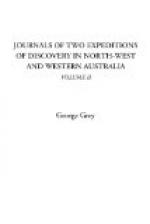Like all other savage races the natives of Western Australia are very fond of singing and dancing: to a sulky old native his song is what a quid of tobacco is to a sailor; is he angry, he sings; is he glad, he sings; is he hungry, he sings; if he is full, provided he is not so full as to be in a state of stupor, he sings more lustily than ever; and it is the peculiar character of their songs which renders them under all circumstances so solacing to them. The songs are short, containing generally only one or two ideas, and are constantly repeated over and over again in a manner doubtless grating to the untutored ear of a European, but to one skilled in Australian music lulling and harmonious in the extreme, and producing much the same effect as the singing of a nurse does upon a child.
SONG OF AN OLD MAN IN WRATH. SCENE PRODUCED BY IT.
Nothing can give a better idea of the character of these people than their songs. In England an elderly gentleman, who has been at all put out of his way by encroachments and trespasses upon his property, sits over his fire in the evening, sipping his port and brooding over vengeance by means of the law; but the law is tortuous, expensive, and uncertain; his revenge is very distant from him; under these circumstances the more the elderly gentleman talks the more irate he becomes. Very different is the conduct of the elderly Australian gentleman. He comes to his hut at night in a towering passion; tucks his legs under him, and seats himself upon his heels before the fire; he calls to his wife for pieces of quartz and some dried kangaroo sinews, then forthwith begins sharpening and polishing his spears, and whilst thus occupied, sings to himself:
I’ll spear his liver,
I’ll spear his lights,
I’ll spear his heart,
I’ll spear his thigh,
etc. etc. etc.
After a while he pauses and examines the point he has been working at; it is very sharp, and he gives a grunt of satisfaction. His wives now chime in:
The wooden-headed,
Bandy-legged,
Thin-thighed fellows—
The bone-rumped,
Long-shinned,
Thin-thighed fellows.
The old gentleman looks rather more murderous but withal more pleasant, and as he begins to sharpen his second spear he chants out:
I’ll spear their liver,
I’ll spear their bowels,
I’ll spear their hearts,
I’ll spear their loins.
As he warms on the subject he ships his spear in the throwing-stick, quivers it in the air, and imitates rapidly the adventures of the fight of the coming day: then the recollections of the deeds of his youth rush through his mind; he changes his measure to a sort of recitative, and commences an account of some celebrated fray of bygone times; the children and young men crowd round from the neighbouring huts, the old gentleman becomes more and more vociferous, first he sticks his spear point under his arm and lies on his side to imitate a man dying, yet chanting




